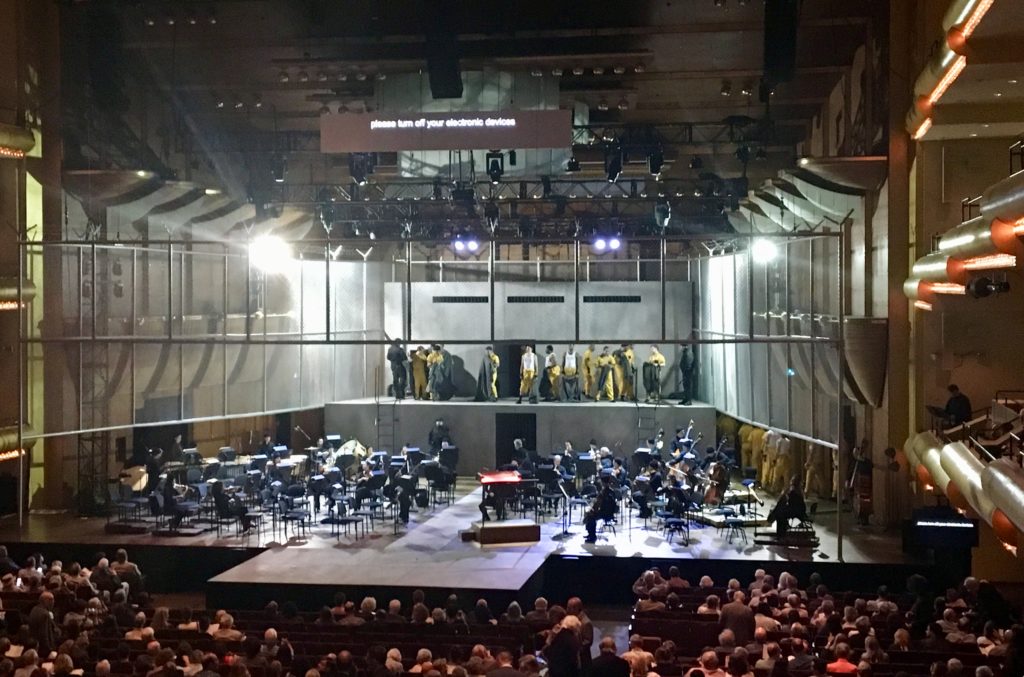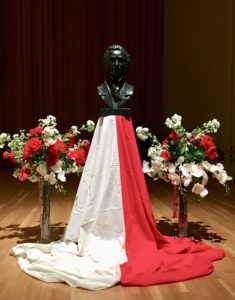Memorable Performances
In the last three months, six of the dozen or so performances I’ve attended have been especially meaningful. Join me on a journey from Florida to New York and back for a recital, two concerts, an opera, a play, and a ballet.
- Delray Beach FL, May 5, First Presbyterian Church: Fabulous pianist Donald Cannarozzi, Music Director at our church, presented an splendid afternoon recital. The opening number was a collaboration with bass Dean Peterson on Brahms’ Four Serious Songs, Op 121, the only composition published in the last year of Brahms’ life. The finale was Schubert’s glorious Piano Sonata in Bb major, DV 960, also his last and greatest work before he died at age 31. Between those towering works, flutist Leeann Bower joined Don forPoulenc’s Sonata for Flute and Piano, composed in 1957, well before he died six years later. I enjoyed being at the recital with my friends Wendy and Peter Jones. I’m grateful to Marvin Blickenstaff, Visiting Professor at Catholic University of America in Washington DC, 1992-93, for enriching my understanding and enjoyment of Romantic music, and to Leslie Nucho, a wonderful flutist with whom I used to play Poulenc’s work.
2. New York City, June 5, Broadway: To Kill a Mockingbird. I’d read the book, of course, but the play had a more powerful impact. The message, that powerless creatures have the right to exist, counteracted reports from our southern border which was dominating national news. Celia Keenan-Bolger, who played Scout, richly deserved the Tony she won four nights later later.
3. New York City, June 6, Lincoln Center: my brother Joel and Elisabeth took me to see Prisoner of the State, a new opera by David Lang, presented by the New York Philharmonic. Inspired by Beethoven’s only opera, Fidelio, Lang portrays a political prisoner whose wife is trying to secure his freedom. As you can see in the photo I took before the conductor came onstage, the orchestra players and the chorus are enclosed in barb-wire fencing.

Prisoner of the State was part of Music of Conscience, the New York Philharmonic’s exploration of the ways in which composers have used music to respond to the social and political issues of their times. The series ran from May 22 through June 8, 2019. It was exciting for us to be there on the opera’s opening night, watching Jaap van Zweden, whom we had seen lead the Dallas Symphony, conduct the Philharmonic. Eric Owens’ rich bass voice was convincing as the Jailer; the chorus was outstanding.
The opera vividly depicts the agony of those imprisoned for their beliefs and the courage of those who attempt to set them free. Though it brought to my mind current scenes from our southern border, it also made me realize anew how deeply Beethoven was concerned about the power of the state (Besides Fidelio, his third symphony, Eroica, conveyed his distrust of Napoleon, who had just proclaimed himself “Emperor.”). This performance grabbed my heart and gave me hope for a better world. New York Times‘ critic Anthony Tommasini liked it, as did I, but i agreed with his reservations about the libretto. Here’s his review and the associated video:

4. Coral Gables FL, June 25-26, the second annual Chopin Festival, Frost School of Music at the University of Miami: After spending the daylight hours with my granddaughters, who live just ten minutes away, I enjoyed two wonderful evening concerts. The first was a Showcase of student musicians, among whom the most compelling was Parker van Ostrand of Sacramento CA. He played Chopin’s Andante Spianato and Grande Polonaise Brilliant, Opus 22 with imagination and finesse well beyond his sixteen years. At intermission I chatted with Parker and his mother and discovered that not only has he already performed with several orchestras, but he lacks only two credits for a bachelor’s degree in mathematics. MIT and Curtis have already invited him to visit–impressive for an incoming junior in high school.
5. Chautauqua, New York, July 3: Steve, Peg, Jack and I saw Pas de deux, by the Charlotte Ballet. We sat up close and could see the dancers’ faces. It was so tender it made me cry. This review in The Chautauquan Daily hints at the romantic beauty we beheld:
Opening the program was Peter Schaufuss’ reconstruction of the balcony scene pas de deux from Sir Frederick Ashton’s Romeo & Juliet. The rarely seen pas de deux, first staged on the Royal Danish Ballet in 1955 to music by Sergei Prokofiev, was danced by Charlotte Ballet’s Chelsea Dumas and Josh Hall.
Ashton’s uniquely beautiful choreography for the scene was a mixture of reserved delicacy and elegance. Rather than focusing on Romeo and Juliet’s impassioned desire for one another, as in other interpretations, the scene appeared to hone in on the couple’s unbridled joy. When the two first meet onstage, they get lost in each other’s eyes and we get lost in their heartfelt discovery of one another.
Hall’s Romeo was dashing to Dumas’ angelic Juliet. Ashton’s illustrative movement for the pas de deux included unusual rolls of the head and shoulders by the dancers, Hall lifting Dumas in arabesque to hop in small steps arcing around the stage, and Dumas contently relaxing into Hall’s embrace, her head resting on his shoulders. The euphoric and dreamy dance concluded with a trio of kisses by the pair as Romeo departed the stage leaving Juliet with one arm raised, smiling and pledging her eternal love for him heavenward.
6. Delray Beach FL, July 7: Each July the Palm Beach Chamber Society provides audiences in Palm Beach County high quality classical concerts, while giving fine local musicians the opportunity to play great chamber music. On Sunday, July 7, I got to hear Lisa Leonard, Professor of Piano at Lynn University in Boca Raton, and cellist Susan Moyer Bergeron, a member of the Naples Philharmonic Orchestra, perform Chopin’s Sonata in G minor, Opus 65.
Lisa is the daughter of the late Judy Leonard, whom I knew for many years in Northern Virginia Music Teachers Association. In high school, Lisa studied with my friend Suzanne Guy. Suzanne had introduced me to this Sonata years ago. It’s the only piece Chopin composed for cello and piano. To hear it rendered exquisitely was a special joy. Alan Walker writes, in Fryderyk Chopin: A Life and Times, that Chopin himself never performed the fiendish first movement of that Sonata. Lisa made it look easy. Afterward, she recognized me as having visited her in Coral Springs, Florida ten years ago, soon after her mother had died. Her husband, trumpeter Mark Reese, also performed on the concert and I got to meet him and their two sons, 8 and 10. It was a joyous reunion.
Leave a Reply